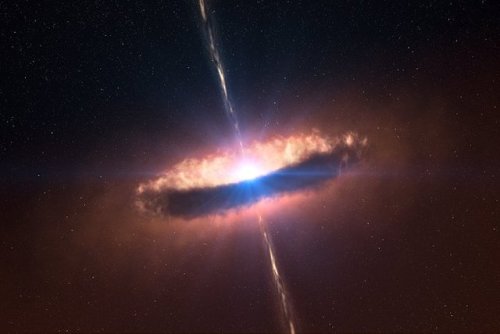Liquid Oxygen Is Magnetic


Liquid oxygen is magnetic
Liquid oxygen sticks between the poles of a strong magnet until it boils away into its gas state. This is because it has unpaired electrons, which make each oxygen molecule a tiny magnet with a dipole. Normally, when oxygen is in a flask or in the air, these microscopic magnets point in all directions, cancelling out and meaning that there’s no net magnetic field. When it pours over the permanent magnet, the magnetic molecules all slightly align, creating an induced magnetic field, which reacts with the permanent magnet, making the oxygen stick to the poles. This is called paramagnetism. Click here to watch the video.
More Posts from Riekod and Others



Chemistry/Physics: Even more smoke tricks
Source




What is a protostar?
The formation of stars begins with the collapse and fragmentation of molecular clouds into very dense clumps. These clumps initially contain ~0.01 solar masses of material, but increase in mass as surrounding material is accumulated through accretion. The temperature of the material also increases while the area over which it is spread decreases as gravitational contraction continues, forming a more stellar-like object in the process. During this time, and up until hydrogen burning begins and it joins the main sequence, the object is known as a protostar.
This stage of stellar evolution may last for between 100,000 and 10 million years depending on the size of the star being formed. If the final result is a protostar with more than 0.08 solar masses, it will go on to begin hydrogen burning and will join the main sequence as a normal star. For protostars with masses less than this, temperatures are not sufficient for hydrogen burning to begin and they become brown dwarf stars.
Protostars are enshrouded in gas and dust and are not detectable at visible wavelengths. To study this very early stage of stellar evolution, astronomers must use infrared or microwave wavelengths.
Protostars are also known as Young Stellar Objects (YSOs).







The Magellanic Clouds are two irregular dwarf galaxies visible in the Southern Celestial Hemisphere; they are members of the Local Group and are orbiting the Milky Way galaxy. Because they both show signs of a bar structure, they are often reclassified as Magellanic spiral galaxies. The two galaxies are:
Large Magellanic Cloud (LMC), approximately 160,000 light-years away.
Small Magellanic Cloud (SMC), approximately 200,000 light years away.
source
Image credit: Primoz Cigler, Joseph Brimacombe, Ed Dunens and EkantTakePhotos

Coal Sack & Carina Nebulae - Stirling Ranges, Western Australia


SNR 0509-67.5: a remnant from a supernova in the Large Magellanic Cloud
Credit: NASA/ESA/Hubble Team/Kevin M. Gill
If Earth had Saturn’s Rings
From an excellent post by Jason Davis
From Washington, D.C., the rings would only fill a portion of the sky, but appear striking nonetheless. Here, we see them at sunrise.

From Guatemala, only 14 degrees above the equator, the rings would begin to stretch across the horizon. Their reflected light would make the moon much brighter.

From Earth’s equator, Saturn’s rings would be viewed edge-on, appearing as a thin, bright line bisecting the sky.

At the March and September equinoxes, the Sun would be positioned directly over the rings, casting a dramatic shadow at the equator.

At midnight at the Tropic of Capricorn, which sits at 23 degrees south latitude, the Earth casts a shadow over the middle of the rings, while the outer portions remain lit.

via x

The First Real Photo Of Entire Earth From Apollo 8 In 1968.
-
 riotouseaterofflesh liked this · 4 weeks ago
riotouseaterofflesh liked this · 4 weeks ago -
 rexyhexa reblogged this · 1 year ago
rexyhexa reblogged this · 1 year ago -
 astraxolotlgirl reblogged this · 1 year ago
astraxolotlgirl reblogged this · 1 year ago -
 astraxolotlgirl liked this · 1 year ago
astraxolotlgirl liked this · 1 year ago -
 princessnefertankh liked this · 3 years ago
princessnefertankh liked this · 3 years ago -
 ghourlock liked this · 3 years ago
ghourlock liked this · 3 years ago -
 jplovecraft liked this · 3 years ago
jplovecraft liked this · 3 years ago -
 ovsilenceandblack reblogged this · 3 years ago
ovsilenceandblack reblogged this · 3 years ago -
 frxzxne liked this · 3 years ago
frxzxne liked this · 3 years ago -
 elaborando reblogged this · 4 years ago
elaborando reblogged this · 4 years ago -
 nichtsichtbar94 liked this · 4 years ago
nichtsichtbar94 liked this · 4 years ago -
 study-dream liked this · 5 years ago
study-dream liked this · 5 years ago -
 miscelanea66 reblogged this · 5 years ago
miscelanea66 reblogged this · 5 years ago -
 starting-anewww reblogged this · 5 years ago
starting-anewww reblogged this · 5 years ago -
 godzillax1 liked this · 6 years ago
godzillax1 liked this · 6 years ago -
 zzz000zzz reblogged this · 6 years ago
zzz000zzz reblogged this · 6 years ago -
 mathematicalardun liked this · 6 years ago
mathematicalardun liked this · 6 years ago -
 collector-of-memes liked this · 6 years ago
collector-of-memes liked this · 6 years ago -
 jackalobotomy liked this · 6 years ago
jackalobotomy liked this · 6 years ago -
 showmeeverythingicanstand liked this · 6 years ago
showmeeverythingicanstand liked this · 6 years ago -
 tu-tuning liked this · 6 years ago
tu-tuning liked this · 6 years ago -
 jannamk792 reblogged this · 6 years ago
jannamk792 reblogged this · 6 years ago -
 themensmallstore liked this · 6 years ago
themensmallstore liked this · 6 years ago -
 scum-wiitch liked this · 6 years ago
scum-wiitch liked this · 6 years ago -
 chemileonxktl reblogged this · 6 years ago
chemileonxktl reblogged this · 6 years ago -
 chemileonxktl liked this · 6 years ago
chemileonxktl liked this · 6 years ago -
 amarac007-blog liked this · 6 years ago
amarac007-blog liked this · 6 years ago -
 the-lazy-kabaneri liked this · 6 years ago
the-lazy-kabaneri liked this · 6 years ago -
 aineshahnaz reblogged this · 6 years ago
aineshahnaz reblogged this · 6 years ago -
 frappyflop liked this · 6 years ago
frappyflop liked this · 6 years ago -
 sunilnanjiani liked this · 6 years ago
sunilnanjiani liked this · 6 years ago -
 inhalefartparticles-blog liked this · 6 years ago
inhalefartparticles-blog liked this · 6 years ago -
 heartmindandsnow reblogged this · 6 years ago
heartmindandsnow reblogged this · 6 years ago -
 kumacurry liked this · 6 years ago
kumacurry liked this · 6 years ago -
 vivek-1993-blog liked this · 6 years ago
vivek-1993-blog liked this · 6 years ago